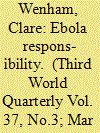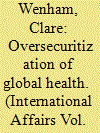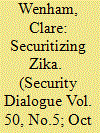|
|
|
Sort Order |
|
|
|
Items / Page
|
|
|
|
|
|
|
| Srl | Item |
| 1 |
ID:
144244


|
|
|
|
|
| Summary/Abstract |
Combating threats of infectious diseases has been increasingly framed as a global shared responsibility for a multi-actor framework of states, international organisations and nongovernmental actors. However, the outbreak of Ebola Virus Disease (EVD) has shown that this governance framework has not been able to limit the spread of this virus, despite the normative and legislative changes to global disease control. By unbundling the concept of responsibility, this article will assess how global shared responsibility may have failed because accountability does not fall on any one state or stakeholder, highlighting an inherent weakness in the global disease governance regime. The paper concludes that a move towards multiple responsibilities may prove a more effective mechanism for ensuring global health security.
|
|
|
|
|
|
|
|
|
|
|
|
|
|
|
|
| 2 |
ID:
185855


|
|
|
|
|
| Summary/Abstract |
In November 2021, the World Health Assembly (WHA) is hosting a special session to discuss the proposed plans for a pandemic treaty. Despite the fact that there are scant details concerning the treaty, the proposal has gained considerable support in both the academic community, and at the international level. While we agree that in the wake of the numerous governance failures during COVID-19, we need to develop appropriate global solutions to be able to prevent, detect, respond to, and recover from future global health crises—and that such mechanisms should be rooted in global equity—we disagree, however, that this pandemic treaty, currently, is the most appropriate way in which to achieve this. Indeed, notions of global community, solidarity, fairness are far removed from the reality that we have seen unfolding in the actions of states responding to the pandemic. This is the crux of the tension with the proposed treaty: the balance between the ideal cosmopolitan worldview held by those in power in global health, and the practice of national security decision-making witnessed in the last 18 months. Indeed, we do not believe that a pandemic treaty will deliver what is being extolled by its proponents, and it will not solve the multiple problems of global cooperation in global health that supporters believe it will.
|
|
|
|
|
|
|
|
|
|
|
|
|
|
|
|
| 3 |
ID:
168423


|
|
|
|
|
| Summary/Abstract |
Linking health and security has become a mainstream approach to health policy issues over the past two decades. So much so that the discourse of global health security has become close to synonymous with global health, their meanings being considered almost interchangeable. While the debates surrounding the health–security nexus vary in levels of analysis from the global to the national to the individual, this article argues that the consideration of health as a security issue, and the ensuing path dependencies, have shifted in three ways. First, the concept has been broadened to the extent that a multitude of health issues (and others) are constructed as threats to health security. Second, securitizing health has moved beyond a rhetorical device to include the direct involvement of the security sector. Third, the performance of health security has become a security threat in itself. These considerations, the article argues, alter the remit of the global health security narrative; the global health community needs to recognize this shift and adapt its use of security-focused policies accordingly.
|
|
|
|
|
|
|
|
|
|
|
|
|
|
|
|
| 4 |
ID:
168492


|
|
|
|
|
| Summary/Abstract |
Brazil’s Zika virus crisis (2015–17), following hot on the heels of the Ebola outbreak (2014–15), dominated newsfeeds and high-level discussions amid governments, the UN system and beyond, with emerging fears relating to Congenital Zika Syndrome (CZS), embodied by microcephaly. However, beyond the ensuing panic in Latin America facing a generation of Zika babies, the outbreak demonstrates key developments in our understanding of the interaction between health and security, based on the Copenhagen School’s securitization approach. It suggests that unlike previous diseases that were securitized, it was not the virus that was the cause of the security threat, nor how many people were affected, but a combined concern over where (in Brazil at a time of domestic political crisis), when (immediately post-Ebola), who (foetuses and babies), how (unknown disease characteristics) and what was the existential threat (the vectorized unknown). This article shows these developments for global health security through empirical analysis of the multiple securitization processes that occurred within Brazil for the Zika virus, at the subnational and federal levels.
|
|
|
|
|
|
|
|
|
|
|
|
|
|
|
|
| 5 |
ID:
187526


|
|
|
|
|
| Summary/Abstract |
Operative paragraph 7 of UN Security Council (UNSC) Resolution 2532 (2020) acknowledges ‘the critical role that women are playing in the COVID-19 response efforts’, the ‘disproportionate negative impact the pandemic is having on women and girls’, and ‘calls for concrete actions to minimise this impact and ensure the full, equal and meaningful participation of women and youth in the development and implementation of an adequate and sustainable response to the pandemic’. This Resolution is clear in its language: states must recognise and respond to the gendered effects of the pandemic. The adoption of Resolution 2532 and subsequently 2565 (2021) is an important opportunity to further integrate health emergencies and UNSC’s Women, Peace, and Security (WPS) agenda. The language is deliberate: it offers global health a set of mechanisms on how to integrate gender into complex crises and, in turn, offers WPS a chance to engage with health and pandemics as a security challenge for women and girls. However, as previous health emergencies and the WPS agenda show us, Resolutions are not a panacea: they are political compromises often riddled with contradictions and are dependent on states and the international community to implement them.
|
|
|
|
|
|
|
|
|
|
|
|
|
|
|
|
| 6 |
ID:
174634


|
|
|
|
|
| Summary/Abstract |
The COVID-19 pandemic affects all countries, but how governments respond is dictated by politics. Amid this, the World Health Organization (WHO) has tried to coordinate advice to states and offer ongoing management of the outbreak. Given the political drivers of COVID-19, we argue this is an important moment to advance International Relations knowledge as a necessary and distinctive method for inclusion in the WHO repertoire of knowledge inputs for epidemic control. Historical efforts to assert technical expertise over politics is redundant and outdated: the WHO has always been politicized by member states. We suggest WHO needs to embrace the politics and engage foreign policy and diplomatic expertise. We suggest practical examples of the entry points where International Relations methods can inform public health decision-making and technical policy coordination. We write this as a primer for those working in response to COVID-19 in WHO, multilateral organizations, donor financing departments, governments and international non-governmental organizations, to embrace political analysis rather than shy away from it. Coordinated political cooperation is vital to overcome COVID-19.
|
|
|
|
|
|
|
|
|
|
|
|
|
|
|
|
|
|
|
|
|